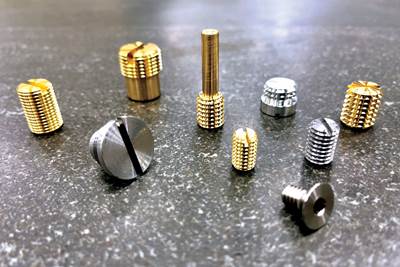CAD/CAM
CAD/CAM software is used to generate part designs and then CNC machining programs corresponding those designs. Short for “computer-aided design/computer-aided manufacturing,” these systems create programs for CNC lathes, multi-axis machines and milling machines. CAD software is used to create parts by designing and drawing, using geometric shapes to construct a model. CAM software must be programmed in order to calculate cutting paths in which the cutting tools that are being used will take to remove material and produce a part. With the high sophistication of multi-axis machines and increasingly complex part geometries, production shops often program offline and not at the machine’s CNC. Also, the ability to create a digital twin, or a duplicate of a CNC machine and its environment within CAM software, has become advantageous for many machine programmers.

ESSENTIAL READING
VIEW ALLVIDEOS: Tips for Screw Making on Swiss-Type Machines
Here’s a three-part video series focused on Swiss screw making to help explain the benefits of thread whirling, back turning and broaching while taking into consideration CAM programming, tooling and machine specifications.
WatchLatest Products
Mastercam Software Improves Programming Flexibility
IMTS 2024: Mastercam introduces Mastercam 2025, with features including Mastercam Deburr for automated edge finishing, finish passes, mill-turn support for Y-axis turning and automatic license update notifications.
Read MoreOpen Mind Technologies CAD/CAM Software Enhances Workflows
IMTS 2024: Open Mind Technologies showcases its HyperMill CAD/CAM software with enhancements to its toolpath capabilities, overall functionality and more.
Read MoreSiemens Software Boosts Efficiency in Parts Manufacturing
IMTS 2024: Siemens Digital Industries Software unveils its NX X manufacturing software, a cloud-based and data-secure CAD/CAM solution for part manufacturing and efficiency.
Read MoreSolidCAM Software Optimizes Swiss Machining Tool Paths
IMTS 2024: SolidCAM provides programming ease of use, flexibility and configurability for complex multi-turret and multi-spindle mill-turn and Swiss CNC machines.
Read MoreSprutCAM Software Update Enhances Robot Support
The update includes Profile Mode for lathe operations, enabling users to now adjust the chamfer angle in profile cycle based on the 3D model.
Read MoreTezmaksan CAM Software Streamlines Robotics Programming
RoboCAM is designed to eliminate the complexities of robotics programming, making it accessible to operators of all skill levels.
Read MoreFeatured Posts
Precision Machining Technology Review: August 2024
Production Machining’s August 2024 technology showcase includes some of the latest technology from SW North America, Tsugami, Siemens, Select Manufacturing Technologies, Hurco and ECI Software Solutions — all on display at IMTS 2024.
Read MoreWho Are the DFM Consultants? You Are.
Modern shops are bolstering their engineering staff to better offer design for manufacturability advice to their customers. Here, one industry expert suggests ways to develop a common language between manufacturing and engineering.
Read MoreLone Shop Machinist Benefits From Five-Axis CAM Modules
This California shop owner applies five-axis strategies for more efficient milling of parts with challenging geometries, free-form surfaces and deep cavities.
Read MoreKeeping Watch on Small Parts
From watch parts to exotic medical applications, this shop takes on the world of micromachining.
Read MorePrecision Machining Technology Review: December 2023
Production Machining’s December 2023 technology showcase includes some of the latest technology from Sandvik Coromant, Nikon Metrology, The L.S. Starrett Co., Walter USA, Kennametal and SolidCAM.
Read MoreHow to Start a Swiss Machining Department From Scratch
When Shamrock Precision needed to cut production time of its bread-and-butter parts in half, it turned to a new type of machine tool and a new CAD/CAM system. Here’s how the company succeeded despite the newness of it all.
Read MoreFAQ: CAD/CAM
What is CAD/CAM?
In the world of metalworking, the CAM part of CAD/CAM (computer-aided design/computer-aided manufacturing) generally means software for programming CNC machine tools. CAD is the computer-aided process that creates a design of a part or object.
Source: CAM at a Crossroads
What is CAD/CAM programming?
There are three methods of writing CNC programs, including using CAD/CAM software. CAD/CAM programming minimizes the need for the programmer to perform complex math calculations. Due to the minimal amount of math required by the programmer, CAD/CAM programming tends to be more efficient than manual programming.
By using an existing CAD drawing file and importing data into the CAM software, the programmer only needs to decide on which process and tooling to employ, typically using a list of tooling data and cutting conditions. The CAM software then calculates all of the moves necessary to machine the part.
What are the disadvantages of using CAD/CAM?
Programmers must keep in mind that there is some potential for unintentionally entering incorrect data. Another problem is that sometimes, the original drawing file is not available to the CNC programmer.
What is the relationship between CAD and CAM?
Most product design is performed on computers using CAD software. Then, that design or drawing file data is imported into the CAM software. After a few selections from the programmer, the CAM software will use that data and calculate the necessary moves to machine the part.
What are the advantages of CAD/CAM?
CAD/CAM programming minimizes the need for the programmer to perform complex math calculations. Due to the minimal amount of math required by the programmer, CAD/CAM programming tends to be more efficient than manual programming.







.jpg;maxWidth=300;quality=90)





















